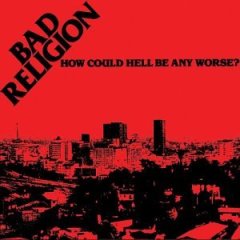1981's "How Could Hell Be Any Worse?" LP began the band's tradition of releasing excellent material, which still exists to this day (see 2002's brilliant "The Process of Belief") some 22 years later, making them the longest-running Los Angeles punk act. Sure they've refined their signature sound over the years, principally by successfully fusing the often-aggressive music with the glorious vocal harmonies ヨ those "oohs and ahhs" ヨ that are the band's greatest distinguishing factor. Since the band's inception, however, there have been numerous line-up changes, most notably the brief hiatus after their second LP "Into the Unknown" was released and their subsequent regrouping in 1984, and then later with the departure of guitarist Brett Gurewitz in 1995 after 1994's classic "Stranger Than Fiction" ヨ the band's proper major-label debut ヨ was released. Consequently, Brian Baker of Minor Threat fame came in and then in 2001, Gurewitz rejoined providing the band with the key ingredient that had been missing on the LPs from "The Gray Race" to "The New America", which are not bad records by any means, but without the partnership of songwriters Graffin and Gurewitz, were somewhat lacking. The Process of Belief, with its sound reminiscent of the Bad Religion of old on albums like "Suffer" and "Against The Grain", proves just how vital Gurewitz is to the band.
In any case, on this, the prolific band's first LP, the line-up is Graffin on vocals, Gurewitz on guitar, Jay Bentley on bass, and Pete Finestone on drums. Greg Graffin is unrivaled as a lyricist. At only 16 on this record, he was honing in on his now-legendary songwriting ability. The record covers a slew of topics, such as religion, politics, not conforming, and the downfall of society, and is still just as relevant today as it was back then, even more so perhaps. It's rife with socio-political commentary. They kick off the record with breakneck speed on "We're Only Gonna Die", on which Graffin relates what "modern man" is headed toward. It's a topic that Bad Religion reflects on often on their records (see "Suffer"'s "When" and "Against The Grain"'s "Modern Man", to name a few). This track includes a breakdown mid-song that slows down the tempo for a verse, as the music begins to gain momentum until it reaches its former speed once again, and finally ends with pleading screams of "Only gonna die from our own arrogance." More of this self-destruction of man by man's own drive for power and greed is evidenced on "Pity": "I show pity on the future to come/When our government system will be omnipotent and we'll be worse off than we are now," and later "If we endure the aggression that's inside all of us/We'll wipe out our own species and thus the world." And the chorus is sung in a beseeching tone as well.
"Part III", which opens with a bass line, is also in the same vein and is eerily relevant in today's embattled climate, with lyrics like "The final page is written in the books of history/As man unleashed his deadly bombs and sent troops overseas/To fight a war which can't be won and kill the human race/A show of greed and ignorance, man's quest for dominance." The song is more mid-tempo and features an intricate guitar solo by Circle Jerks' (and would-be Bad Religion) guitarist Greg Hetson. And the listener can easily feel the pain in Graffin's voice in his realization of all the ills in the world on the classic "Fuck Armageddon...This Is Hell", which includes the albums' title in the chorus: "How could hell be any worse, life alone is such a curse." Yes, these are some bleak lyrics, but the band does the job of showing the listener that changes are needed in society. And this is exactly why Bad Religion's music is as significant in the year 2003 as it was in 1981. Meanwhile, "Oligarchy" is a tirade on the government and "In the Night" has a claustrophobic, panicky feel to it, as it evokes images of torment and distress.
They also question the institution of religion on quite a few songs, such as "Faith in God", which opens with a great guitar riff, with lyrics like "They'll tell you you can't have your own way/unless you pay money and dedicate your life or you'll be damned in hell," as well as "Eat Your Dog" and the satirical mock-televangelist "Voice of God is Government," with Graffin's minute-long sermon that truly is a precursor to his rant as a politician in "The State of the End of the Millennium Address" off 1998's "No Substance". In any case, on "Voice of God", he speaks over somewhat slow music, which gains speed following the speech and the chorus, as they break into the first verse. The sound on this LP is raw, almost as if it was recorded on a 4-track or something, and incredibly intense. The artwork is rather minimal as well: the sleeve is comprised of only two colors ヨ it's red with black type and a photo of the city.
If you've never heard Bad Religion, I suggest checking this record out first ヨ not just because it's their debut and you have to listen to the band's work chronologically, but because this LP started it all, has all the basic components that were to be heard on later releases (only rawer), and just because it is so damn good.

